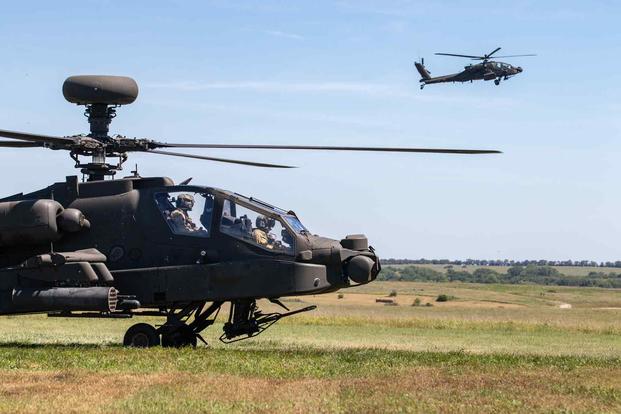An Army AH-64 Apache crash at Fort Riley, Kansas, on Tuesday left two pilots injured, marking yet another aviation incident in a string of crashes for the service.
The pair of soldiers with the 1st Infantry Division's Combat Aviation Brigade were being treated for injuries after the crash, which occurred during gunnery training, according to a spokesperson for the installation. It's unclear what caused the crash, and officials are investigating the incident.
The Army has been marred by a seemingly constant string of helicopter incidents, particularly among Apache and Black Hawk helicopters. Last year, the service saw 10 incidents, including 14 fatalities -- far outpacing deaths occurring in combat operations abroad.
Read Next: Army Pumping Millions into Food Kiosks, But They May Soon Be Obsolete
Army aircraft have been grounded twice since the spring of last year -- once servicewide after nine soldiers died in April 2023 in a crash that involved two Black Hawk helicopters out of Fort Campbell, Kentucky.
That incident marked one of the deadliest training mishaps in Army history. Later that month, three 11th Airborne Division soldiers died when two Apaches collided.
Last year's incidents also include a November crash in which five Army special operations soldiers died in a Black Hawk crash in the Mediterranean Sea, off the coast of Cyprus.
As frequent as last year's crashes were, incident rates with Army aviation so far this year are roughly three times that compared to last year, according to data provided by the service.
The Army National Guard grounded its aircraft in February after back-to-back Apache crashes, one in Mississippi where two soldiers died and another earlier that month in Utah. That crew survived.
In March, two soldiers were injured in an Apache crash at Joint Base Lewis-McChord, Washington. Two days later, two more soldiers were injured in another Apache crash at Fort Carson, Colorado. Additionally, two New York Guardsmen supporting border security missions died in southern Texas in a UH-72 Lakota crash, which also killed a border patrol agent.
Units were ordered in early April to go over safety procedures and other additional training by Friday. However, the service has been short on answers as to why incidents are on the rise.
The incidents have been partly attributed to pilots flying less with the winding down of the post-9/11 wars. Since 2012, flight hours across the Army's top three helicopter platforms have dipped dramatically, according to data provided by the Army.
Flight time with the Apache dropped the most -- about 50%. Chinook pilots have 36% less time in the air, and the Black Hawk, the service's premier workhorse, is flying 25% less.
Service officials have historically been swift to place blame on service members and slow to examine equipment or training doctrine relevant to safety concerns.
"If we have known issues with certain helicopters, we need to know so we can resource your department in a manner that protects the lives of our brave women and men in uniform," Sen. Kirsten Gillibrand, D-N.Y., said in a letter to Defense Secretary Lloyd Austin last year.
Related: In Wake of Fatal Black Hawk Crash, Renewed Scrutiny of the Helicopter's Safety Record












